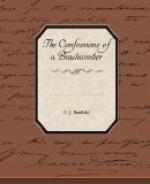Our blacks saw “friends” on the mainland beach, and lit two signal fires. Mickie said, “Me tell ’em that fella bring basket.” Cross-examined, he had to admit that the two fires merely signified a general invitation to his mainland friends to come across. Then—“That fella got ’em basket, me get ’em.” A friend doubted the range of the black’s vision, which was truly telescopic, as we frequently verified with a pair of powerful field glasses, but not to be thought inferior in this respect, he solemnly declared that he saw Jinny’s cousin on the beach strike a light for his pipe. At first the irony of the remark was not appreciated, then Jinny (after vainly peering across the sea), saw the joke and gave a wild exhilarating exhibition of amusement. She sat down and rolled about shouting and screeching, hardly able to tell Mickie the fun, and when he was let into it the pantomime was the more extravagant. The outburst continued throughout the day at intervals, Jinny apologising for her boisterousness with reiterations—“Misser Johnssing say he been see ’em cousin belonga me light ’em pipe!” Jinny still rehearses the story at frequent intervals, and with hysterical outbursts.
ZEBRA’S VANITY
To half civilised blacks a racecourse is an earthly paradise; a jockey, a sort of demi-god. A lady shut up her house one race day, leaving “Zebra” in charge. Returning, she was amazed to find one of the big rooms open, and to hear the buzz of a sewing machine. Zebra, trouserless, scarcely took the trouble to look round as he informed her—“Me make ’em trouser all a same Yarraman (horse).” His desire for tight riding breeches was not restrained, and the consequence was in the nature of a disaster.
LAURA’S TRAITS
Laura was a bad girl. Like Topsy, she acknowledged her naughtiness, but never attempted to reform. A considerable quantity of milk had disappeared from a jug, and her mistress asked—“You been drink milk, Laura?” “No, missis, me no drink ’em.” But the tell-tale moustache of cream still lingered on her lips. Laura lived in a quiet home, where there were no children, and few dishes to wash. The State Orphanage was not far away, and the children thereof paraded every day on their way to the State school. Gazing at the long procession marching two by two Laura, with a far away look in her eyes, said—“Missis. Me no like wash ’em plate belonga these fellas!” Laura was wont to be sent to Sunday school, where her ways were precise and demure, and where her natural smartness gained her credit, and many good conduct tickets. Once she was overheard at her devotions—“Please, Mr God, make missis strong woman, make missis good woman!” She was sick, and her mistress insisted upon administering castor oil, but Laura made a fuss. At last her mistress said—“All right, Laura, suppose you no take ’em medicine, I go for doctor.” “No, no, missis. Me die meself!”




